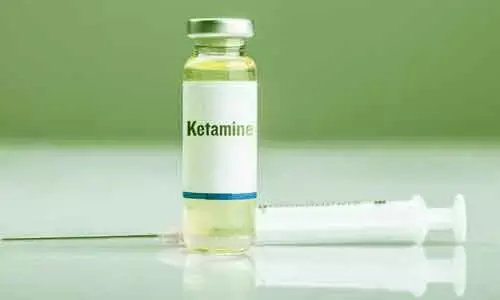- Home
- Medical news & Guidelines
- Anesthesiology
- Cardiology and CTVS
- Critical Care
- Dentistry
- Dermatology
- Diabetes and Endocrinology
- ENT
- Gastroenterology
- Medicine
- Nephrology
- Neurology
- Obstretics-Gynaecology
- Oncology
- Ophthalmology
- Orthopaedics
- Pediatrics-Neonatology
- Psychiatry
- Pulmonology
- Radiology
- Surgery
- Urology
- Laboratory Medicine
- Diet
- Nursing
- Paramedical
- Physiotherapy
- Health news
- Fact Check
- Bone Health Fact Check
- Brain Health Fact Check
- Cancer Related Fact Check
- Child Care Fact Check
- Dental and oral health fact check
- Diabetes and metabolic health fact check
- Diet and Nutrition Fact Check
- Eye and ENT Care Fact Check
- Fitness fact check
- Gut health fact check
- Heart health fact check
- Kidney health fact check
- Medical education fact check
- Men's health fact check
- Respiratory fact check
- Skin and hair care fact check
- Vaccine and Immunization fact check
- Women's health fact check
- AYUSH
- State News
- Andaman and Nicobar Islands
- Andhra Pradesh
- Arunachal Pradesh
- Assam
- Bihar
- Chandigarh
- Chattisgarh
- Dadra and Nagar Haveli
- Daman and Diu
- Delhi
- Goa
- Gujarat
- Haryana
- Himachal Pradesh
- Jammu & Kashmir
- Jharkhand
- Karnataka
- Kerala
- Ladakh
- Lakshadweep
- Madhya Pradesh
- Maharashtra
- Manipur
- Meghalaya
- Mizoram
- Nagaland
- Odisha
- Puducherry
- Punjab
- Rajasthan
- Sikkim
- Tamil Nadu
- Telangana
- Tripura
- Uttar Pradesh
- Uttrakhand
- West Bengal
- Medical Education
- Industry
Ketamine reduces seizures in refractory status epilepticus, Finds study

According to recent research published in the Journal of Neurology, ketamine treatment was associated with a decrease in seizure burden in patients with super-refractory status epilepticus.
Ayham Alkhachroum and associates from the Departments of Neurology and Neurosurgery, Columbia University, New York, NY; and Departments of Critical Care Medicine and Clinical Neurosciences, University of Calgary, Canada conducted the study to test the ketamine infusion efficacy in the treatment of super-refractory status epilepticus (SRSE).
We also studied the effect of high doses of ketamine on brain physiology as reflected by invasive multimodality monitoring (MMM), the authors described.
The researchers studied a consecutive series of 68 patients with a Mean age of 53 ± 18 years and those with SRSE who were admitted between 2009 and 2018, treated with ketamine, and monitored with scalp EEG. Out of the total sample, 46% of patients were female. Eleven of these patients underwent MMM at the time of ketamine administration. We compared patients who had seizure cessation after ketamine initiation to those who did not, they further added.
2.2 ± 1.8 mg/kg/h was the average dose of ketamine infusion, with a median duration of 2 days. However, the average dose of midazolam was 1.0 ± 0.8 mg/kg/h at the time of ketamine initiation and was started at a median of 0.4 days before ketamine.
Based on the methodology, the following findings were deduced-
- There was at least 50% decrease in the seizure burden within 24 hours of starting ketamine in 81% of the patients, while complete cessation was observed in 63% of patients.
- Ketamine was associated with stable mean arterial and with decreased vasopressor requirements over time.
- There was no effect on intracranial pressure, cerebral blood flow, or cerebral perfusion pressure.
As a result, the researchers concluded that "the data supports the notion that high-dose ketamine infusions are associated with decreased vasopressor requirements without increased intracranial pressure. Ketamine treatment was associated with a decrease in seizure burden in patients with SRSE."
Dr. Nandita Mohan is a practicing pediatric dentist with more than 5 years of clinical work experience. Along with this, she is equally interested in keeping herself up to date about the latest developments in the field of medicine and dentistry which is the driving force for her to be in association with Medical Dialogues. She also has her name attached with many publications; both national and international. She has pursued her BDS from Rajiv Gandhi University of Health Sciences, Bangalore and later went to enter her dream specialty (MDS) in the Department of Pedodontics and Preventive Dentistry from Pt. B.D. Sharma University of Health Sciences. Through all the years of experience, her core interest in learning something new has never stopped. She can be contacted at editorial@medicaldialogues.in. Contact no. 011-43720751
Dr Kamal Kant Kohli-MBBS, DTCD- a chest specialist with more than 30 years of practice and a flair for writing clinical articles, Dr Kamal Kant Kohli joined Medical Dialogues as a Chief Editor of Medical News. Besides writing articles, as an editor, he proofreads and verifies all the medical content published on Medical Dialogues including those coming from journals, studies,medical conferences,guidelines etc. Email: drkohli@medicaldialogues.in. Contact no. 011-43720751


